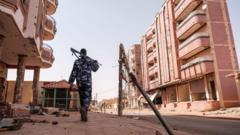The transition from dictatorship to justice remains fraught with challenges as Syrians seek closure for decades of oppression while balancing fragile sectarian relations.
Syria's Path to Justice After Assad's Fall: A Daunting Challenge Ahead

Syria's Path to Justice After Assad's Fall: A Daunting Challenge Ahead
Amid calls for accountability, the new Syrian leadership faces immense obstacles in prosecuting the regime's crimes.
As the dust settles from the recent overthrow of Bashar al-Assad's 54-year rule, the aftermath of Syria's protracted civil war is revealing disturbing truths. The end of the regime has led to the release of prisoners, exposing heinous torture methods inflicted upon dissidents and ordinary citizens alike. Numerous records highlight the magnitude of detentions, while mass graves reveal the somber fate of victims.
In light of these revelations, there is a burgeoning demand among Syrians for accountability against high-ranking figures of the fallen regime. Following the transition, the new rebel-led government pledged to initiate proceedings against those responsible for egregious human rights violations, including murder and torture. "Justice is crucial for Syrians to heal from this dark chapter," stated Ayman Asfari, the head of a coalition advocating for human rights and governance reform.
However, the road to justice in a ravaged and fragmented nation like Syria proves daunting. Historical precedents from other countries, including Egypt and Tunisia, underscore the difficulties of establishing meaningful justice following the collapse of oppressive governments. Each of these nations struggled to bring about comprehensive accountability following their transitions.
Syria's unique sociopolitical landscape further complicates matters. The rift between the newly empowered Sunni majority and the former Alawite regime could escalate sectarian strife if not carefully navigated. Additionally, years of regime manipulation have left the judicial system ill-prepared to efficiently address the extensive human rights violations committed during Assad's reign. With thousands potentially implicated, many officials may evade prosecution altogether.
As it stands, economic despair hovers over the nation, with 90% of the population living in poverty, a shattered infrastructure, and ongoing humanitarian crises. Experts like Nerma Jelacic emphasize that rebuilding trust is crucial in creating a reliable framework for accountability. "These measures take time, and establishing the groundwork should precede any prosecutorial actions," she advised.
Under pressure to act swiftly, Syria's transitional leaders announced goals to hold accountable the orchestrators of the abuses, promising a forthcoming “List No. 1” of officials involved in misconduct. Yet, the reality remains stark: many prime suspects, including Assad, are ensconced in safety abroad, complicating matters significantly.
International bodies focused on transitional justice in Syria have accumulated evidence over the past decade but caution against hasty prosecutions. The focus should first be on establishing a governance system that earns citizens' trust, rather than appearing as punitive measures against rival sects or political factions.
Key steps forward involve addressing displacement issues, restoring properties commandeered during the war, supplying essential services, and ensuring fair treatment across diverse community members. Justice must be founded on legitimacy, as vindictive legal processes risk deepening societal fractures.
Prospective legal reforms should aim to restructure the police and judicial systems, offering a framework to handle the slew of abuses. Investigating the fate of the numerous people who vanished under the previous regime remains pressing.
Failure to act strategically could unleash vengeful impulses among a populace yearning for justice. Some observers note that without a timely approach to accountability, cycles of retribution might spiral into larger instances of violence reminiscent of past conflicts experienced in Libya and Iraq.
A thoughtful consideration of history suggests that describing and processing the systemic repression under Assad's rule necessitates wider-reaching initiatives than merely prosecuting individuals. Advocates propose a comprehensive truth-telling initiative akin to South Africa’s Truth and Reconciliation Commission to facilitate understanding of the oppressive apparatus that defined Syria's recent history.
Yet, as various sects and social groups come to terms with a long legacy of violence, the absence of timely successes in justice will continue to represent vulnerabilities in the fragile state that is emerging from the crushing weight of its past.




















